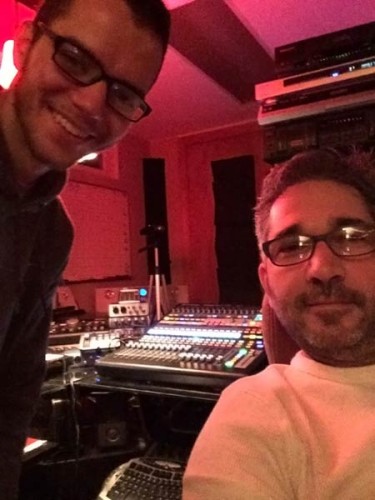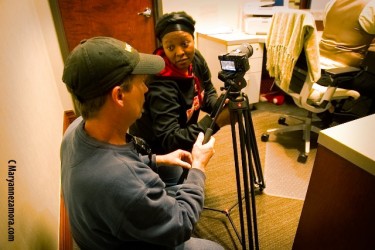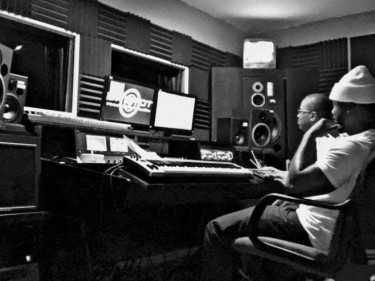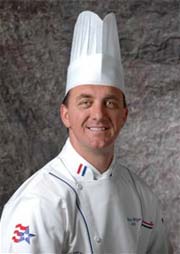
RC apprentice Tim Barry and mentor Doug Wallace at Studio 128
It’s funny, It seems like they never really go anywhere…I constantly get emails, I constantly get quick little texts here and there, things that they’ve heard or things that have inspired them, things that they’ve run into during their own either performances or recording or setting something up or at somebody else’s studio, and something that reminded them of myself or a lesson that we had talked about, or whatever the experience is. So they never really go anywhere….I’m impressed with the fact that they don’t punch out, you know what I mean? They’re always on the clock, they’re always moving, they’re always learning, they always got the ear on something, and they’re always willing to share it. I get a text at 2:30 in the morning, just something that happened to whoever, or, “Here, check out this link. How do I get my drums to sound like this,” or “What do you hear in that?” It’s kind of cool. It’s definitely impressive to me.
RRFC: What sorts of mistakes do you see being made by a younger generation of budding engineers as far as etiquette that you would like to see improve?
Doug: I see people, especially younger kids, they flounder on how to actually communicate…It’s your job as an engineer, it’s your job as the person in control of the actual project or this whole steamship or train moving forward, to keep things going clearly and cleanly and just as we spoke about during the preproduction meeting, because nobody else is going to keep that sight line in place. When you’re dealing with artists, there’s a lot of creativeness that goes on that can actually steer you in different directions, and my job as an engineer, as a producing engineer, is you need to keep a hand on that and keep reminding them of the vision that we spoke about. If it’s changed, that’s fine, but let everybody know that the change is happening. It’s my job to say, “You’re kind of steering away from what we had talked about, and if that’s what you want to do its fine, but I need to let you that this is kind of off course, and it’s going to cost you more money.” So as somebody who doesn’t talk to anybody and basically texts everybody and talks to everybody through Facebook and Snapchat, those skills that you usually develop through just talking to people through life are not as inherent as they once were.
RRFC: What was it about the format of learning with the Recording Connection that made you want to be a mentor?
Doug: The fact that there is a mentorship program, meaning that these kids don’t have to travel across the country in our case, to reap the benefits of acquiring some practical knowledge…The fact that you guys at Recording Connection, take kids and place them in working studios where people are actually doing something hands-on, and they can get some one-on-one information and time, is probably the final package for me.
RRFC: What do you think makes the program a valuable asset not only to the apprentice but also to you as the mentor?
Doug: It keeps me grounded in basics, because when you do this type of work every day, just like anything else, you start taking shortcuts, and you got these templates built, and so forth, and you really start forgetting the basics. So every time a new student comes through, you have to kind of put yourself into check and realize, “Okay, I’m kind of missing a couple things here. I forgot to do some gain staging, which I really should be doing instead of spending so much time in post-production. If I just game stage it right from the get-go, I wouldn’t be messing around with this mix now.” Things like that help you keep things in check, because there is a certain flow of doing things, although there’s no right or wrong to any of this, but there are certain guidelines you want to follow that kind of works with your work flow…I have a younger aspiring hip-hop artist who knows the values of knowing the production side of things, up to a 45-year-old who has been around music his whole life and has made CD’s and just really wants to know what the engineer is doing to get the end result. He wants to be part of that. So it really keeps me grounded.
* * * * *










